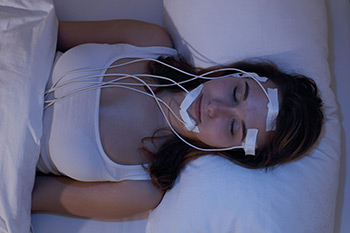Applications for the Fall 2024 Cohort have closed. Applications for Fall 2025 are now available.
Nationwide, the field of sleep health is growing rapidly.
Polysomnography includes technologists working directly in sleep labs as well as other health professionals working with sleep patients in dental offices, hospitals, general practice clinics, and various other locations. As an academic leader in sleep health and sleep medicine, Oregon Tech offers programs to help students achieve (or advance) a career in sleep.
About the online Polysomnography Technology Program

Oregon Tech’s Polysomnography program was the first of its kind and continues to lead the way in Polysomnographic education. From 2021 to 2023, 88% of our graduates passed the national board exam, most on their first attempt. Graduates have not struggled to find employment and are well prepared for careers in the growing field of sleep.
Year | Positive Placement Outcome | Status within 12 Months of Graduation |
|---|---|---|
| 2022 | 77.78 | 7 of 9 graduates employed |
| 2023 | 80.0 | 4 of 5 graduates employed |
| 2024 | 50.0 | 2 of 4 graduates employed (5th 2024 grad not working due to health reasons) |
Students are trained by highly skilled technologists across the nation. Clinical coursework is completed in a fully-equipped accredited sleep lab in or near the student’s town rather than a typical classroom lab setting.
After obtaining the RPSGT credential, students may also want to consider the Bachelor of Science in Health Care Management.
| Degrees offered within the polysomnographic technology program | |
|---|---|
| Associate of Applied Science | Certificate |
Polysomnographic Technologists perform and score overnight sleep studies, which lead to identification and treatment of sleep disorders. The large majority of a polysomnographic technologists and technicians work is completed overnight. Along with sleep studies, work includes much patient interaction and patient education.
The Polysomnographic Technology program is designed for students preparing to sit for the Registered Polysomnographic Technologist (RPSGT) examination offered through the Board of Registered Polysomnographic Technologists (BRPT). While completion of our Polysomnographic Technology certificate program is sufficient to sit for the exam, the AAS may provide a pathway to higher education or career advancement. This AAS is also available to students who are currently RPSGT’s looking for a pathway to higher education or career advancement.
Interested applicants should confirm with their state licensing board’s website that graduation from a CAAHEP accredited certificate program as well as RPSGT status is sufficient to be licensed in their state. Some states, such as New York, require an associate degree as well as RPSGT status, and other states don’t require a license at all.
Program Start
The Polysomnography program begins each Fall term. The application deadline is typically early August each year, and the deadline for admission to the University is typically early September. These deadlines are to allow time for completion of affiliation agreement contracts and student onboarding with clinical sites. Late applicants may be considered depending on clinical site availability.
Certificate and associate degree students all complete the certificate cohort classes first – these courses run from September to June. Attendance is full-time. Associate degree students will continue with their general education coursework following completion of the certificate courses and may do so at a part-time pace if necessary. Returning students who’ve already completed the certificate portion of the program may complete a returning student application for any term.
Clinic Details
Students complete 540 clinical hours (18 credits) at an OIT-affiliated sleep lab or sleep center. The first two terms (fall and winter) are completed on night shift, followed by a term (spring) of mostly day-shift hours. Thus, students can expect to spend an average of 18 hours per week at a sleep lab for 30 weeks (three academic terms). Upon admission, please email the PSG Program Director, Michael Schwartz (michael.schwartz@oit.edu) as soon as possible. You and Michael will begin the (potentially lengthy) process of securing a clinical site for your rotation. Once secured, you will begin the process of student onboarding as instructed by the clinical site.
Who is Eligible?
Applicants to this program must meet Oregon Tech’s admission criteria. Admitted students should have a valid BLS or CPR card and access to current immunization records.
A criminal background check must be completed prior to clinical placement. We will review your results electronically. Go to www.castlebranch.com.
- Click "Place Order" at the top of the page.
- If you live in Oregon, enter package code RG52.
- If you live outside Oregon, enter package code RG52OS.
Next Steps
Additional Resources
Accreditation
Northwest Commission on Colleges and Universities
Oregon Institute of Technology is accredited by the Northwest Commission on Colleges and Universities. NWCCU is an institutional accrediting body recognized by the Council for Higher Education and/or the Secretary of the U.S. Department of Education.
Commission on Accreditation of Allied Health Education Programs
The Polysomnographic Technology program is accredited by the Commission on Accreditation of Allied Health Education Programs (CAAHEP – www.caahep.org) upon the recommendation of the Committee on Polysomnography (CoPSG).
Commission on Accreditation of Allied Health Education Programs
25400 US Highway 19 N., Suite 158
Clearwater, FL 33763
727-210-2350
www.caahep.org
*Please note that only the PSG Certificate program is CAAHEP accredited; not the PSG AAS degree.


